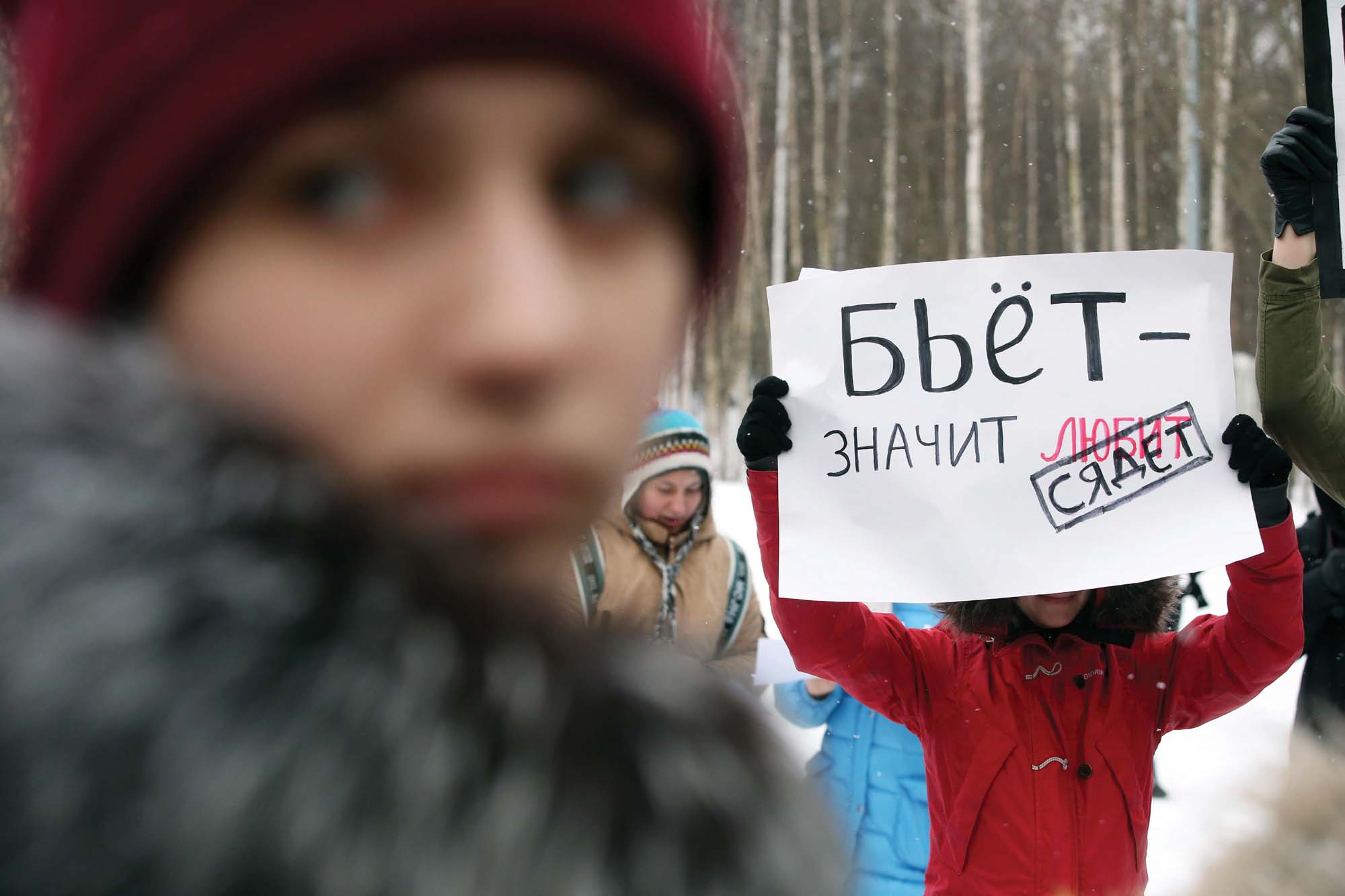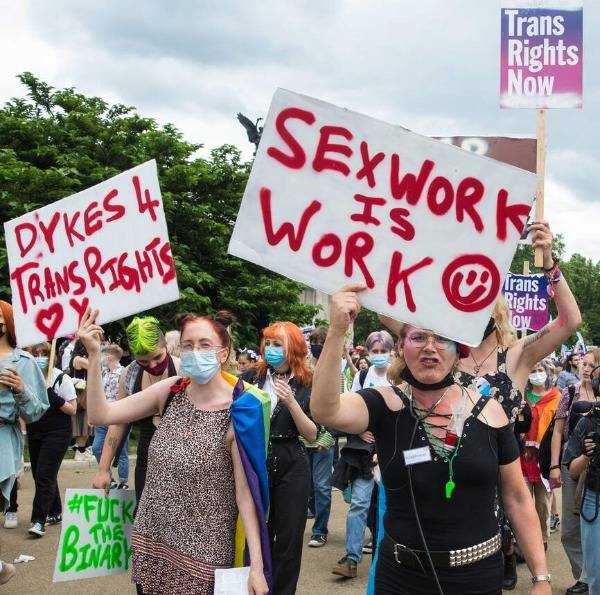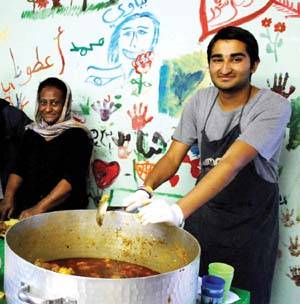
This article is a preview from the Summer 2018 edition of New Humanist
When the violence turned on their three-year-old son, Irina Petrakova knew she had to leave her husband. Petrakova, a 38-year-old lawyer from Moscow, was six months pregnant with her first child when her husband first started beating her. “I was so worried about the baby’s health,” she says. “Over the years it got worse and the beatings became more severe. In 2014, I ended up in hospital with a concussion after he repeatedly punched me.”
She got a divorce, and moved into a new flat with her children. But her ex-husband continually tracked them down; breaking into the apartment, behaving violently. “We had to move four times before he stopped. When I reported it to police, they said it wasn’t ‘anything out of the ordinary’ and refused to press charges.”
Petrakova’s case is not unique. Domestic violence is endemic in Russia, with an estimated 40,000 women affected each year, and at least 12,000 women dying at the hands of their abusers – around 40 women a day, according to Russian government statistics. Official estimates are conservative since much of the abuse goes unreported, but even these figures show domestic violence rates in Russia to be 37 times higher than in the United States, where 1,706 women die each year from domestic violence.
Despite the staggering scale of the problem, the Russian government recently made it easier for domestic violence to go unpunished. In February 2017, Russian president Vladimir Putin signed a law decriminalising any violence that does not cause serious injury, defined as that requiring hospital treatment. Beatings that leave bruises, scratches or bleeding but do not cause broken bones or concussion are no longer a criminal offence. Only if there is a second beating within a year can it be considered criminal. Police are no longer obliged to proactively investigate violence. If survivors of domestic abuse want to file a complaint they must collect evidence and a doctor’s report themselves.
The law was proposed by Yelena Mizulina, Chairman of the Duma Committee on Family, Women and Children Affairs, to limit “state meddling” in the family and to protect “family values”. The ultra-conservative lawmaker, who was behind the controversial 2012 law banning “gay propaganda” and who has advocated to end women’s access to free abortions, said it was ridiculous that a family member could be labelled a “criminal” for a “slap”. She has also publicly declared: “a man beating his wife is less offensive than when a woman humiliates a man.” According to Russia’s state polling agency, 59 per cent of Russians support the law, with just 17 per cent “fully against it”.
While Russia is a state party to the United Nations (UN) Convention for the Elimination of All Forms of Discrimination Against Women, there is an ongoing failure to engage with its recommendations. UN Women’s Regional Director for Europe and Central Asia, Alia El-Yassir, told me that the UN “urges the country to adopt comprehensive legislation to prevent and address violence against women, including domestic violence, and ensure that women and girls who are victims of violence have access to immediate means of redress and protection and that perpetrators are prosecuted and adequately punished.” There is currently no definition of “domestic violence” or “discrimination against women” in the Russian law.
Petrakova was devastated when the new law put an end to the criminal case against her ex-husband that she had spent months assembling. In the end, he received 120 hours of community service for two episodes of beating. In her police testimony, however, Petrakova outlines 23 episodes of violence. She believes the law will only further endanger victims of domestic violence. “A woman writes a complaint, then her husband receives a fine, which he pays out of their joint bank account,” she said. “They lose money, he gets angry and beats her again. That’s exactly what happened to me when my ex-husband found out I had complained.”
Women’s rights groups argue the law has emboldened violent men, and has left women with little recourse to rhetorical or legal justice. “The law sends a message that men can beat their wives and that the government does not care. Domestic violence has escalated,” says Marina Pisklakova, Director of the Anna Centre, a Moscow-based shelter for domestic violence sufferers. Two days after the bill was signed, the mayor of Russia’s fourth largest city, Yekaterinburg, announced on Facebook that the number of calls to police in Yekaterinburg regarding domestic violence rose from about 120-130 per day before the bill to 300-350 per day thereafter.
Maria Dovytan, a Russian lawyer specialising in cases involving domestic violence, says women no longer see any point at all in making reports to the police: “Before, there were some measures to prevent violence and protect victims, but these are now gone.”
The law is likely to exacerbate an existing culture in which Russian police do not take cases of domestic violence seriously, often dismissing it as a private matter. According to the Anna Centre, some 72 per cent of women who sought assistance from a national helpline never reported the abuse to police. Of those women who did, 80 per cent were unsatisfied with the police response. And many who find the courage to report the violence to the police are simply sent back to their abusers.
In November, Yana Savchuk called police to her house in Oryol, 200 miles south of Moscow, saying that her boyfriend was going to kill her. The officers who arrived derided her pleas for help. “If you get killed, we will definitely come to examine the body,” one officer joked, as recorded on Savchuk’s phone, before leaving without offering her any protection. Less than an hour later, Savchuk was beaten to death by her boyfriend.
“Police try to create the perception that it is women’s fault, and talk them out of pressing charges. They are under pressure to show high rates of solved cases to their superiors, and domestic violence allegations are complex,” says Katya Kermlin, a feminist tech pioneer who has created devices to protect women from violence.
* * *
Public attitudes toward women in Russia are contradictory. The Russian government has long promoted equality in the workplace: a 2017 report by Grant Thornton, the global professional services firm, found that almost half of all senior management positions at Russian companies were occupied by women – a larger proportion than in any other country in the world. Yet in a 2015 review on discrimination against women in Russia, the UN expressed its concern at the “persistence of patriarchal attitudes and stereotypes” which consider “women primarily to be mothers and caregivers”. The term feminism is deeply unpopular in Russia, even among women who advocate gender equality. It is typically seen as a radical western imposition that threatens the primacy of the family.
Sexist attitudes and gender stereotypes are entrenched in Russian society, where women often shrug off domestic abuse with the proverb “if he beats you, it means he loves you”. Gender stereotypes and myths around sexual violence uphold a perception that the victim is to blame. “Women are seen to be responsible for keeping a happy home,” says Pisklakova. “An admission of domestic violence is an admission of their failure as wives and mothers.”
Women’s role in Russia’s history is complicated. In the Soviet Union, women were granted equal political and economic rights to men in the public sphere by Joseph Stalin’s 1936 constitution. The state required women to work to help build socialism; they were encouraged to complete their studies and professional training, and to become scientists, doctors, engineers, journalists or even construction workers. Compared to many Western societies, this was a major achievement. However, the lived reality was a different story. Women were still expected to raise children – the state proclaimed reproduction to be “the highest form of service to one’s people and state” – and take care of the household, therefore bearing a double burden. In return, the state supported the working mother with extensive maternity and welfare benefits which, in addition to wage levelling, lessened women’s financial dependence on men. The Soviet state required women to perform a much more multifaceted role than men, whose sole duty was to support the public economy. Soviet gender equality was fundamentally driven by the economic and demographic needs of the state, and so did little to transform traditional gender stereotypes.
International rights organisations and academics often argue that Russia’s transition following the collapse of the Soviet Union in 1991 overwhelmingly disadvantaged women. Women continued to bear the dual burden of professional contributions and motherhood; this time in a catastrophic economic climate which plunged more than one third of the population into poverty. Unemployment, inflated house prices and cuts to social welfare increased women’s economic dependence on men, which academics cite as a major factor contributing to the surge in domestic violence in post-Soviet society. Men particularly struggled to adapt to the new conditions: they were dying earlier, drinking more and committing suicide in greater numbers than ever before in Soviet times.
The end of communism saw the revitalisation of patriarchal concepts in popular culture and mass media: the androgynous female worker was transformed into a sexual object in the new commercial space. Putin’s ascent to the presidency in 2000 marked a nationalistic turning point in Russia, which reinforced and utilised gender stereotypes for political legitimation. The Russian administration has produced a masculinised brand of patriotism and subsequently promoted homophobia and sexism, fostering a heteronormative culture of misogyny and male impunity. State-owned media often paints Putin as a bare-chested macho leader who has masculinised Russia after the humiliating fall of the Soviet Union. Putin has made misogynistic and homophobic remarks throughout his presidency. Last year, he said: “I don’t have bad days because I’m not a woman”, and declared he would not shower next to a gay man because he would not want to “provoke him”. He joked about rape last February and has boasted that Russian sex workers are the world’s best.
Patriarch Kirill, head of the Russian Orthodox Church and Putin’s close ally, has played a significant role in popularising gender stereotypes. The church’s traditional values have seen a rapid resurgence since the fall of the Iron Curtain, with 70 per cent of Russians identifying as Orthodox (up from around 30 per cent in 1991) according to a 2017 Pew study. Through its nationalistic ideology, the church casts Russia as a “defender” of morality in the face of the decadent and corrupt values of the liberal west. The extent of the church’s political influence was laid bare with the law decriminalising domestic violence. “We think that the term ‘domestic violence’ is connected to ideas of radical feminism where a man is often portrayed as a potential aggressor,” said the church’s commission on family affairs in a 2015 statement.
Feminist activists argue that the increasingly close partnership between the Kremlin and Patriarch Kirill – who considers feminism a “dangerous phenomenon” – has threatened women’s autonomy and reproductive rights. Leaders of the Orthodox Church have called for legislation that would ban abortions, and have blamed incidents of rape on the victims’ “indecent” appearance.
* * *
The situation has been compounded by the state’s legal crackdown on civil society following the 2011/2012 mass anti-Putin protests. Since 2012, organisations receiving external funding and engaged in loosely defined “political” work are required to register as “foreign agents”, or face hefty fines and/or criminal proceedings. In 2016, the Anna Centre was placed on the foreign agents list. “It’s also an attempt to damage our reputation,” said Pisklakova, who claims the centre has also been accused of publishing false statistics about domestic violence.
As Putin’s autocratic grip chokes civil society, women are turning to the internet to campaign for their rights. In Russia and other autocratic regimes, the internet has served as a quasi, or alternative, public sphere for many rights groups. Women on the internet are “using the language of rights, both in voicing claims in consentful ways, and in engaging online in ways that are confrontational and oppositional,” writes Vikki Turbine, a professor at Glasgow University.
Anna Zhavnerovich, a 31-year-old fashion journalist, sparked a huge public response when she posted an article about her boyfriend’s attacks. She chronicled the brutal details of the violence in two dispatches for the Russian website W-O-S, where she normally wrote lifestyle articles. Alongside the article she posted pictures of her swollen face and purple, bruised eye sockets, and included advice on how to stay alive.
Zhavnerovich’s story became one of the website’s most widely read articles. She was flooded with hundreds of messages from women who shared their experiences with domestic violence and said they too struggled to register their complaints with the authorities. But messages of abuse came in the thousands: “Bitch,” they called her; “a hysterical wretch.” “You provoked the man. Nothing bad happens to good girls,” they wrote.
The #MeToo movement that advanced awareness of women’s rights to the forefront of discussions in the US, Europe and parts of Asia and Africa garnered very little attention in Russia. But women – particularly the younger generation in Moscow and St Petersburg – are certainly trying. After the murder of 19-year-old Tatiana Strakhova at the hands of her ex-boyfriend in January, hundreds of Russian women posed on social media wearing only their underwear alongside the hashtag #ThisIsNoReasonToKill. In 2016, a campaign on ru.net called “I’m not afraid to say” was launched, highlighting the everyday instances of gendered sexual violence that women face. It has gained increasing traction.
Clearly, women like Zhavnerovich are waging a war against deep-seated attitudes that have kept domestic violence in the shadows for far too long, but the hundreds of messages of support they have received show that their efforts are eroding the taboo. In fact, polls show that awareness of the problem is rising. In a survey last September by the state-funded VTsIOM agency, 77 per cent of respondents said they are sure that many cases of domestic violence go unrecorded. Almost half doubted that victims receive adequate official assistance or support.
As for Petrakova, it has been almost two years since her ex-husband came looking for her and her two children. She hopes that they have finally found their peace. But what about the millions of other women, whose voices are muffled by the government’s trivialisation of domestic abuse?
While women wait for Russia’s epidemic of domestic violence to be legally recognised, families are not “protected” – they are shattered, and many more women die. That is the fault of politicians and religious leaders who continue to stand in the way of legal progress.

